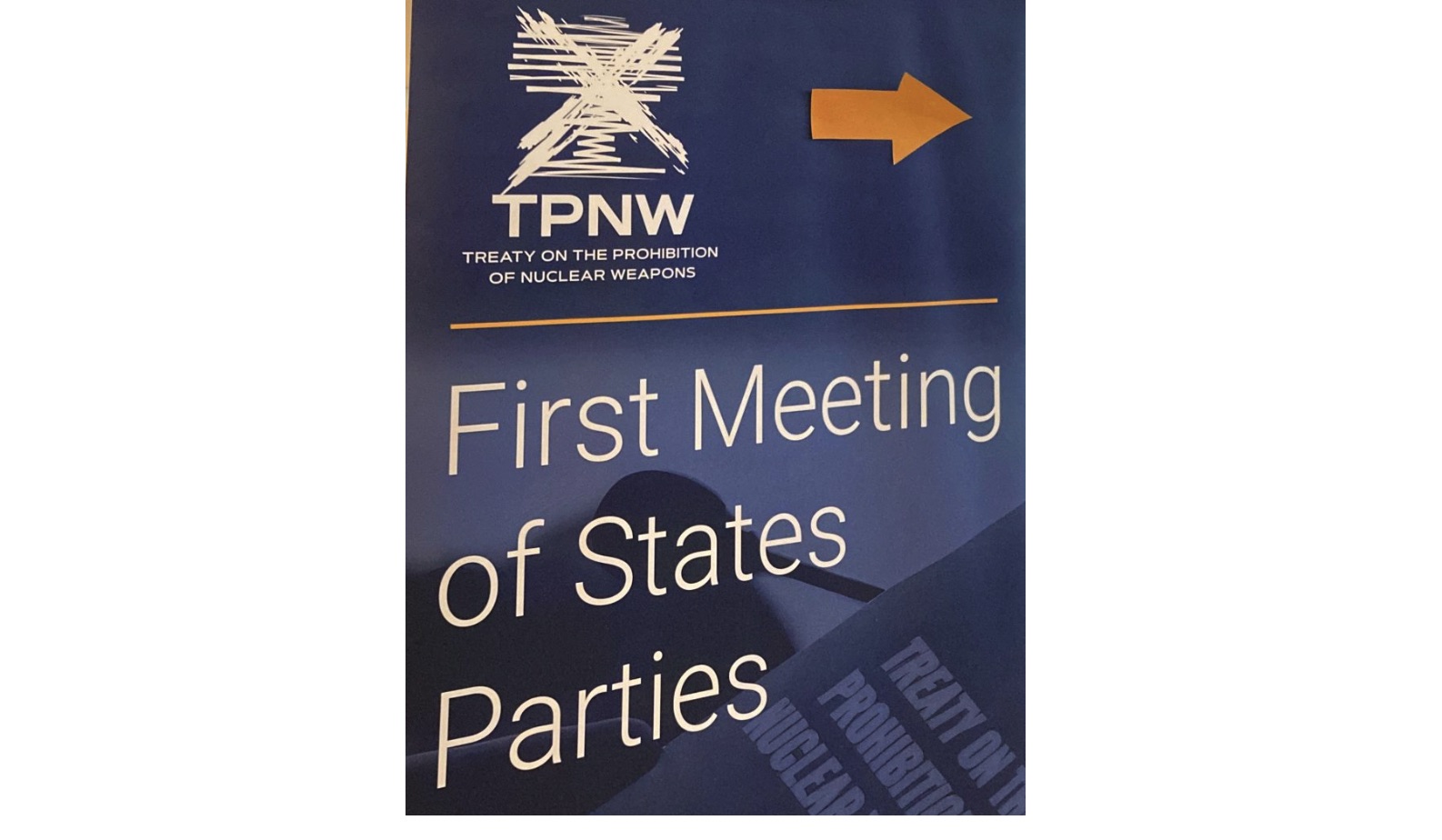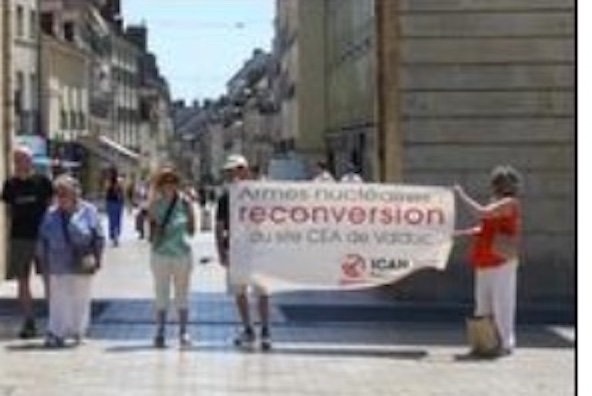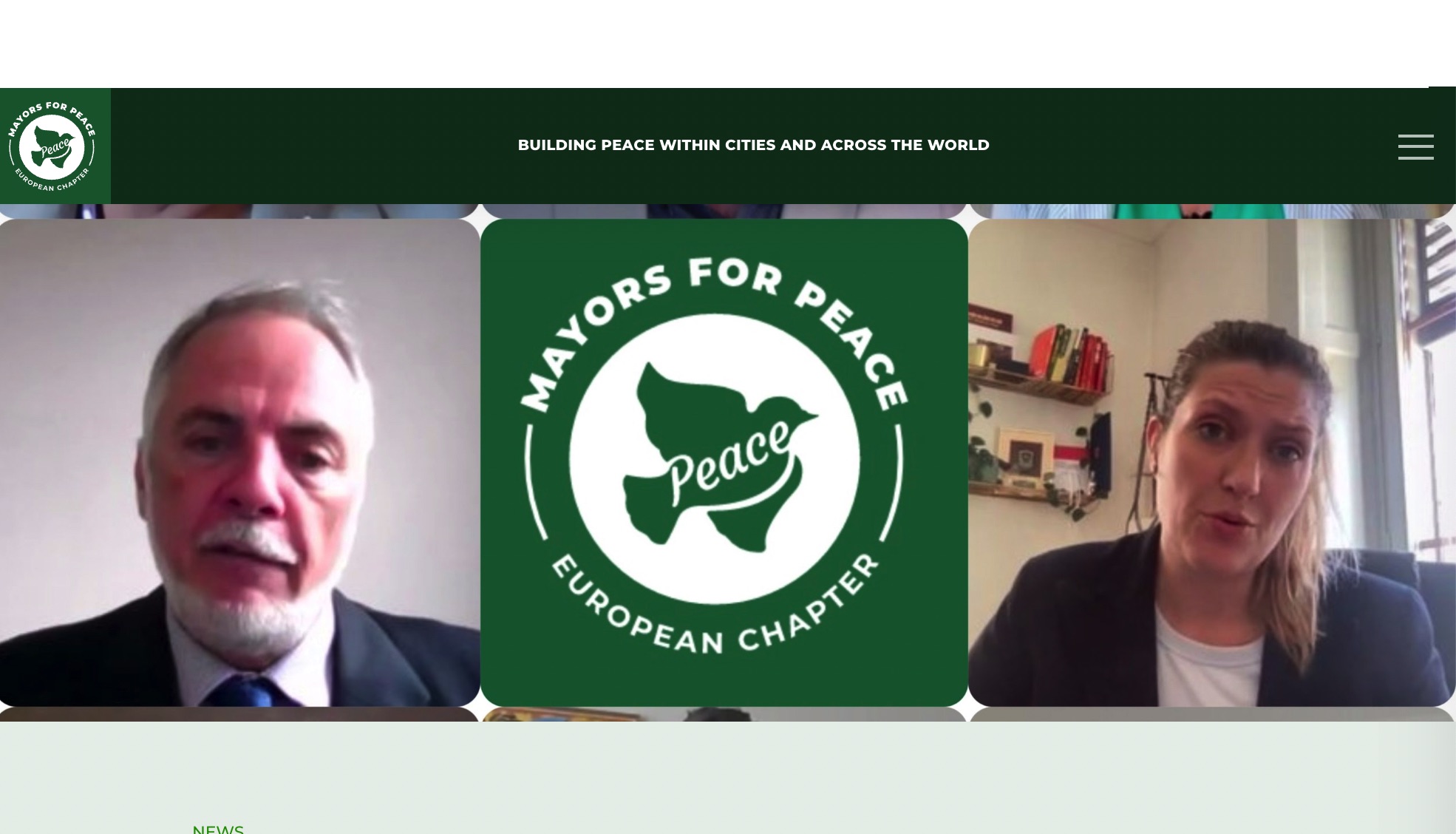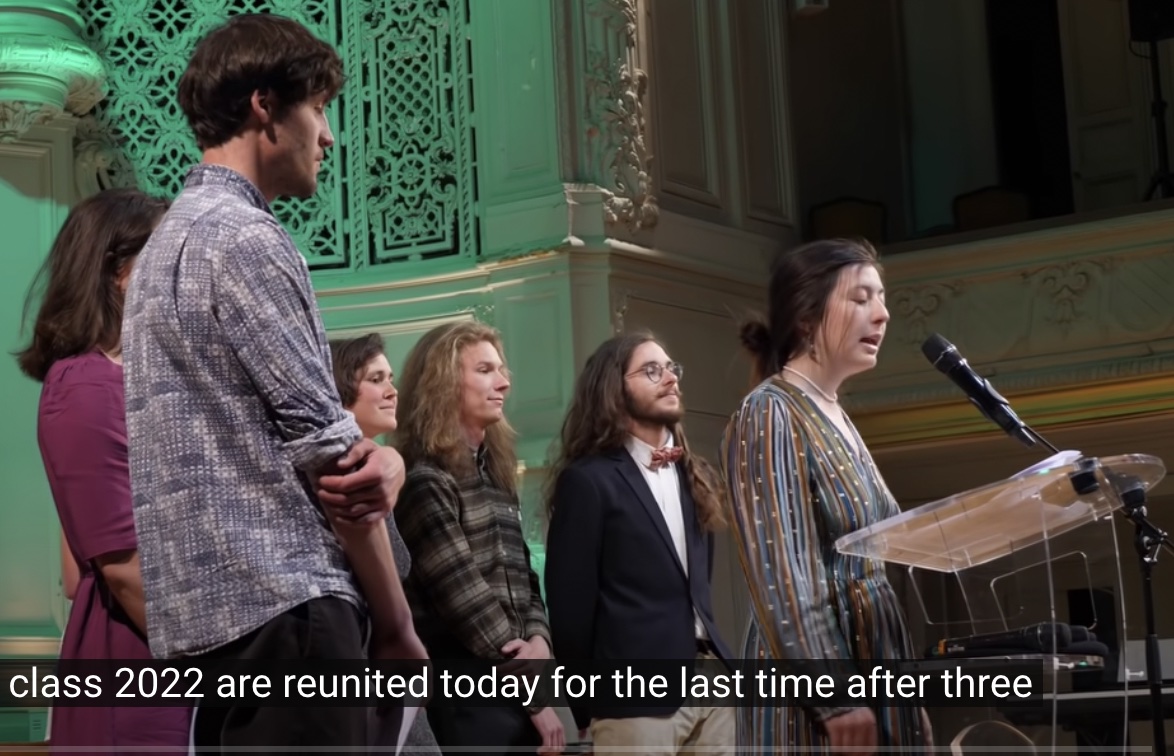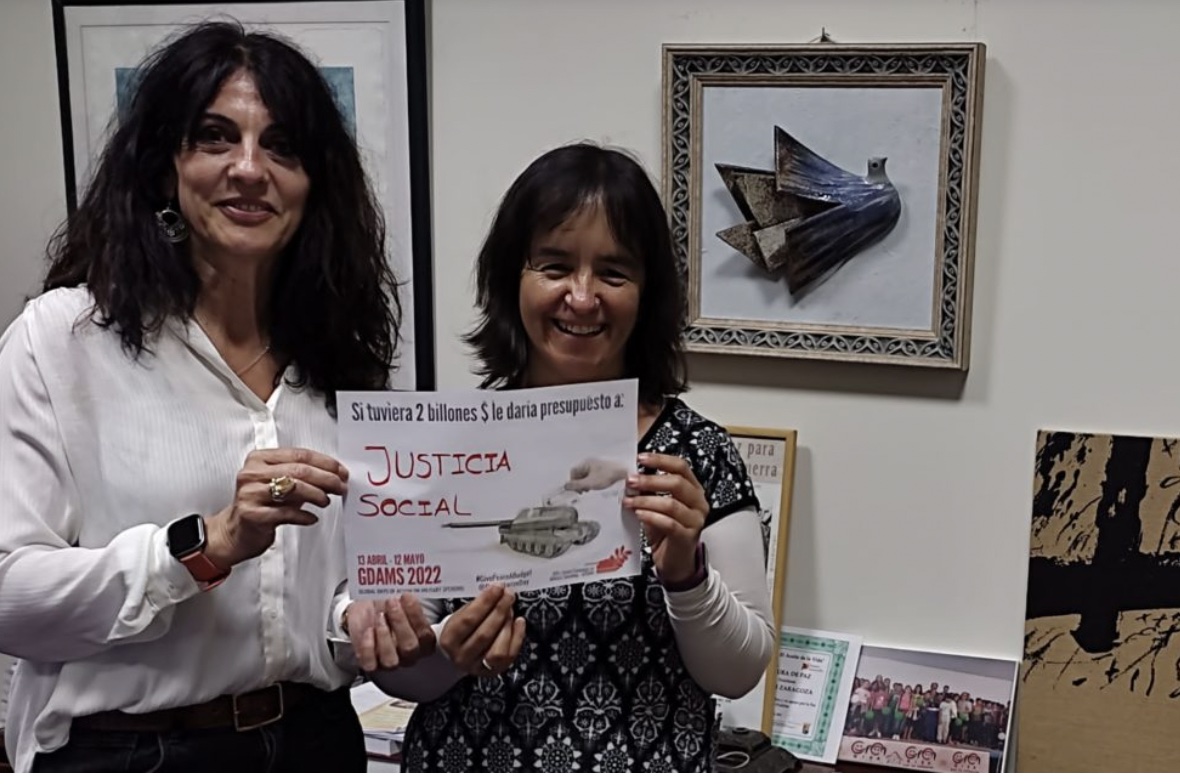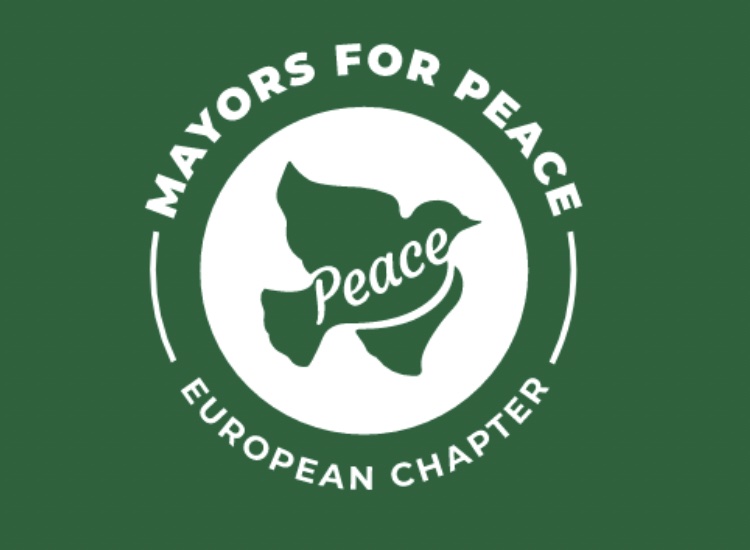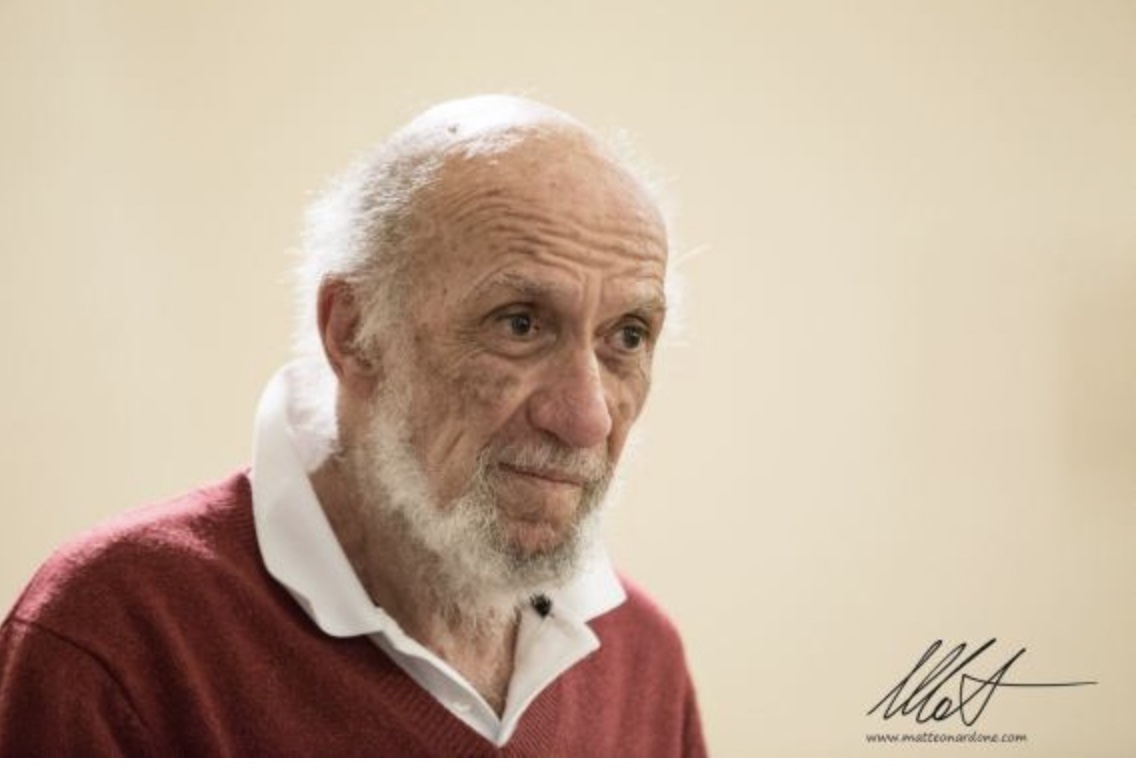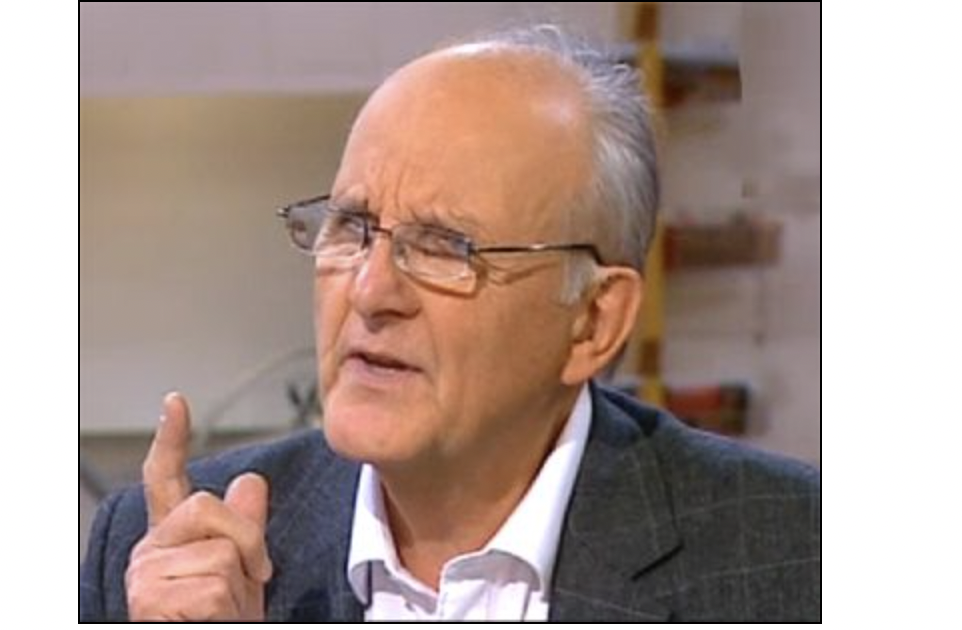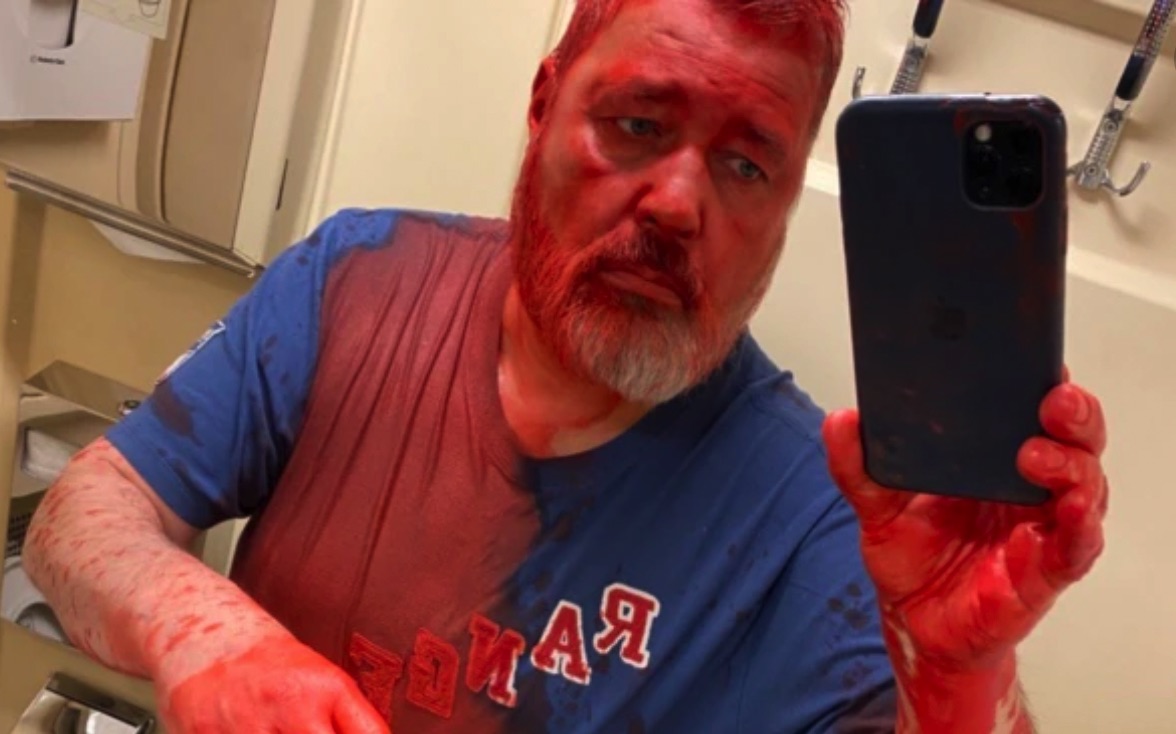FREE FLOW OF INFORMATION
An article by Ellen Teague in the Independent Catholic News
I wonder how many people hearing Bruce Kent speak about peace activism in a Tablet webinar on 12 May and then seeing him attend the annual Conscientious Objectors service in Tavistock Square on 15 May marvelled at his continuing inspirational commitment to peacemaking in his 93rd year. Of course, he was partly able to manage it with his wife of 34 years – companion peace campaigner, Valerie Flessati – alongside him. But by the end of May Bruce was struck down by illness and died on 8 June. The strongest Catholic voice for peace and nonviolence in the UK was silenced. Or was it?
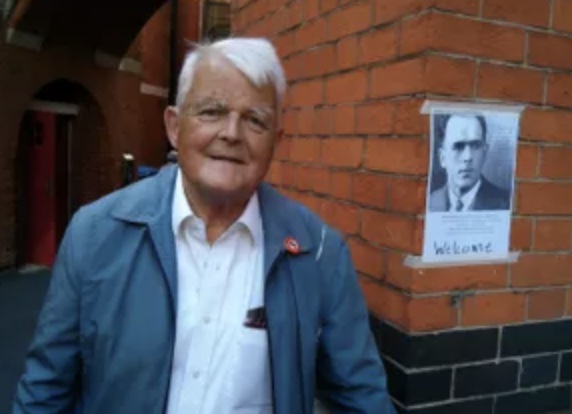
Bruce Kent with his hero Franz Jägerstätter
He was a great orator and his words at Pax Christi AGMs, Justice and Peace events, protests at places from Trafalgar Square to Faslane and literally thousands of events over the years will continue to inspire the millions who heard him speak live. Indeed, many talks and interviews can be accessed on the internet. He reached one million people at just one event – the Hyde Park march and rally in London against the Iraq War on 15 February 2003. “Wave your banners” he said, “what a beautiful sight you are” and engaged the crowd probably better than anyone else that day.
But speaking out was never linked to the size of an event. In early March he felt compelled to join a small CND delegation delivering a letter to the Russian Embassy in London, which said: “For the sake of Ukrainian children taking shelter from Russian missiles; for the sake of all those who will die if the situation escalates and for the sake of the millions of us who will perish if the heightened risk of nuclear war turns into a nuclear conflict, we urge your government to halt the attacks, withdraw the troops and withdraw the nuclear threats.”
He lent support to many campaigns. Earlier this year when Campaign against the Arms Trade highlighted the seventh anniversary of the Saudi-led coalition’s entry into the war in Yemen, where the Coalition’s bombing campaign caused around 9,000 civilian deaths with many more injured, he said, “I am so glad that you have drawn attention to the barbarism of the war in Yemen in which Britain, as an arms supplier, is very responsible.” His last blog for the National Justice and Peace Network called for Catholics to support the Peace agenda of Pope Francis – eight years younger than himself. And in it he deplored that at COP26, the recent UN meeting on Climate Change held in Glasgow, the massive contribution to CO2 output by the world’s military hardly got a mention despite all the efforts of peace activists outside the official meeting.
The most prominent Catholic peace activist in Britain for more than half a century, Bruce Kent has served in management of the Campaign for Nuclear Disarmament (CND), the International Peace Bureau, the Movement for the Abolition of War, as well as Pax Christi, the Catholic Movement for Peace. He has been vice president of both CND and Pax Christi UK.
But where did his focus on peace come from? Much is told in his autobiography ‘Undiscovered Ends’ which was produced in 1992 with only two-thirds of his life lived!
His compassion for people facing hardship or trouble, and victims of conflict, goes back to his youth. During schooldays at the Jesuit’s Stonyhurst College “where I became an orthodox, right wing young Catholic” he remembers making a fuss about the situation of a cleaner who had a two mile walk to work and he thought transport should be provided. All his life he was quietly attentive to people on the margins. After a period of national service in the British Army, where he served in Northern Ireland, and reading law at Oxford University, he entered a seminary to train as a Catholic priest. The seminary encouraged outreach and he paid weekly visits to a TB sanatorium. He reflected that, “being a Catholic was more than reciting prayers and saying Mass.”
In 1969 he was in Biafra during the Nigerian Civil War and saw the victims of the embargo imposed there. He used to point out that one and a half million people starved to death and the blockade was made possible by British weapons. “Biafra taught me the importance of fighting injustice’s causes – not just its symptoms” he said, and he has felt the same about the many wars since that time. To ignore the causes of injustice and war “is to short-change the poor of this world”. He felt that war and militarism could not be treated as separate issues by any aid agency dealing seriously with poverty.
Bruce was first introduced to the Catholic peace movement in the 1960s. He had met and greatly admired US Archbishop Thomas Roberts SJ at that time, who played a significant role in promoting recognition of conscientious objection to war, using the example of Franz Jägerstätter, an Austrian Catholic who was beheaded in 1943 for his refusal to serve in Hitler’s army. People like Jägerstätter, Roberts argued, should know they have the clear support of Church teaching. He also took the view that nuclear weapons involve immoral actions: the destruction of innocent people and a willingness to perform such acts in given circumstances. Bruce had witnessed ‘Ban the Bomb’ demonstrations in London and developed an affinity with peace campaigners and conscientious objectors. It was a decade that saw him working for Cardinal John Heenan in Archbishop’s House, being made a ‘monsignor’, and clearly being earmarked as a rising star in the Church. He heard remarks about damaging his career if he remained active with CND, but peacemaking had become his primary vocation.
In the 1970s Bruce was juggling chaplaincy work, parish work and peace commitments, including working in the CND office. He was inspired by the great encyclical Peace on Earth in 1963 and in 1971 by the “remarkable” document on the Church and Justice produced by the Bishops’ Synod in Rome. Called Our World and You it focused on poverty, peace, education for justice and the Church’s duty to practice what it preaches. In 1980 he became the General Secretary of the Campaign for Nuclear Disarmament, at a time when Britain announced it would be hosting American cruise missiles and build new Trident nuclear submarines with American missiles and British warheads. Membership of CND mushroomed throughout the 1980s. Bruce spoke at huge rallies, wrote articles, did interviews, debates, and visited local groups. He often returned on a late-night train from meetings round the country and rose to say early Mass in his parish before heading to the office for another hectic day. There was also a growth in heated attacks on himself and on CND. On 6 August 1986, for example, as he completed a long walk from the nuclear submarine base at Faslane in Scotland to Burghfield, the nuclear bomb factory in Berkshire, the minutes’ silence for the dead of Hiroshima and all wars was drowned out by the loud music of opponents.
Questions related to this article:
Where in the world can we find good leadership today?
His greatest sadness was that the Catholic Church “kept the peace movement at arm’s length,” although a CND survey in the early 1980s found that 25 percent of members were also Christians active in their churches. However, there were exceptions – the late Bishop Victor Guazzelli, former President of Pax Christi, and Bishop Thomas McMahon of Brentwood who broke ranks to call for Britain to take first steps to de-escalate nuclear build up. Bruce praised Cardinal Basil Hume “who gave me generous support” despite mounting personal criticism of Bruce’s role in CND by prominent Catholics. These were years when nuclear disarmament was a hot political issue, constantly in the news. For Bruce, things came to a head with the prospect of a 1987 general election promising another bitter contest over the nuclear issue, and further personal attacks on his leadership role in CND.
He felt he was in an impossible position. “Many of my fellow Catholics, and other Christians, told me that what I was doing as a priest gave them hope”, he says, “though I knew that most of my bishops did not think my work was priestly”. In February 1987 he took the decision to retire from active ministry, saying “I no longer find it possible to cope with the strain resulting from the tension between my pastoral role which means so much to me and what is thought to be an unacceptable political role”. In the 30 years since that time Bruce has continued his peace activism. Since 1988, his wife and peace activist Valerie Flessati has been by his side.
Bruce felt an affinity with all peacemakers and all would testify to his generosity and kindness in affirming others. At the 60th anniversary of Christian CND last year, Bruce and Valerie gave highlights of CCND campaigning. One participant said, “I will never forget Bruce turning up at Greenham Common – the site of cruise missiles – to bring chocolates and some warming Scottish ‘water of life’ during the biblical 40 days of rain after the caravans were evicted in September 1982, and many times after that!” He loved social gatherings and at his birthday parties he would have an array of party games ready for young nieces and nephews and others. My own family received cards from him regularly, whether praising articles or encouraging artistic endeavours. He gave time to sitting for son Luke and the resulting painting is today in the Bradford Peace Museum.
Bruce had endless positive energy, creativity and insight into important issues. The National Justice and Peace Network has called him a “modern prophet” and praised him for understanding “that all justice issues are connected, although his own focus was on ending war and building a culture of peace”. He was behind the DVD, Conflict and Climate Change, produced in 2009 which made links between militarism and human-induced global warming. In his speech at Coventry University last November, where he was awarded an Honorary Doctorate, he urged the student audience: “Please think for yourselves. Don’t be swept along by whatever happens to be the propaganda of the day. Ask your own critical questions. For example, why are people risking their lives trying to cross the Channel in small boats?” It was interesting when Pax Christi friends had occasional outings to the cinema to view some worthy film, that Bruce would loudly lament the adverts for violent films which preceeded it and which he felt should not masquerade as entertainment. He had an allergy to violence of any kind.
Bruce was an outspoken opponent of the British Government planning to spend more than £200 million on building and maintaining another generation of nuclear weapons to replace Britain’s current Trident system. He felt it makes nonsense of any British commitment to rid ourselves and the world of nuclear weapons. “If you have these weapons, you intend to use them” he would say, “and that is immoral”. He urged support of the UN Treaty on the Prohibition of Nuclear Weapons.
Bruce educated young people about citizenship and the work of the United Nations. “I go into schools of all sorts” he said, “and ignorance of the good work of United Nations and of its sub agencies, of the International Court of Justice, or the International Criminal Court is massive”. It grieved him that, “the miracle which brought the UN to life in on 26 June 1945 remains so small a priority in the Church, and in public life generally”.
Bruce admired Pope Francis and supported his work on any action related to peace, justice, equality and the global trusteeship of our world. Bruce felt that peace on Earth is going to depend on joined up education and campaigning on overcoming poverty, militarism and climate chaos, and that Pope Francis understands these connections. “I believe in nonviolent solutions to problems” he said and was delighted that Pope Francis chose to focus on ‘nonviolence as a political choice’ for his World Peace Day message for 1 January 2017. He was full of admiration for people like Pat Gaffney, former general secretary of Pax Christi, who work quietly and constantly for the common good.
In fact, he was always anxious to recognise women. He applauded his own mother for the strong influence of her Catholic faith in his early years growing up in Hampstead, London, and also being “very generous and outgoing”, and Valerie for her peace publications and wisdom on strategising for peacework. Bruce and Valerie knew Franzisza, the widow of Franz Jägerstätter, personally and admired her support of her husband’s stance despite being left to raise their three children on her own, harassment from the local community and widowhood of seven decades. He commended Jo Siedlecka of Independent Catholic News for her interest in publishing peace events and stories, and women religious for their loyal support of Pax Christi.
Bruce engaged with groups outside church circles, wherever he found kindred spirits. In 1988 he walked 1000 miles from Warsaw to Brussels (NATO) calling for a united peaceful nuclear-free Europe. In 1999 he was British co-ordinator for the Hague Appeal for Peace, a 10,000-strong international conference in The Hague, which initiated some major campaigns (e.g. against small arms, the use of child soldiers, and to promote peace education). It was this, along with his friend, Professor Joseph Rotblat’s Nobel acceptance speech calling for an end to war itself, that inspired Bruce to establish in the UK the Movement for the Abolition of War. In 2019 the International Peace Bureau awarded Bruce the Sean MacBride Prize in recognition of his life’s work for peace and disarmament. Bruce also engaged with refugees, visited prisoners and campaigned for prison reform. He was a patron of the Palestine Solidarity Campaign.
Bruce said once: “I have always been a glass half full not half empty person and in terms of peace and social justice the Catholic glass is very much half full”. He felt it was amongst groups of visionary people such as Justice and Peace groups and Pax Christi, “that I find my own sources of life and inspiration”. He was, “a comfortable member of my own parish but it is with its Justice and Peace Group that I am really at home and of one mind.”
I was always surprised that Bruce was sometimes seen as a contentious figure by some Catholics. He spoke such good sense with eloquence and vast background knowledge, always ready to listen to others and to engage with differing opinions. In private, the hospitality of Bruce and Valerie was legendary, surrounded in their flat by books, posters and memorabilia testifying to their faithfulness to their vocation as Catholic peacemakers. They were strongly ecumenical too. Just over a year ago, Bruce and Valerie were jointly awarded the Archbishop of Canterbury’s Lambeth Cross for Ecumenism, “for exceptional, tireless and lifelong dedication to the Christian ecumenical search for peace, both individually and together.” He was widely admired. At the London service for conscientious objectors in Central London five years ago, there was great excitement that Sir Mark Rylance was speaking, but the award-winning actor himself said his highlight of the day was meeting his “hero”, Bruce Kent.
The media was buzzing with tributes as soon as his death was announced. From around the UK and internationally Bruce was described as “a true man of peace”, “one of the greatest peace campaigners the world has ever known” and “a great human being and a prophet”. I found particularly moving, “our society is weakened by his passing”.
Bruce’s favourite quote from Catholic Social Teaching was from Pope Paul VI’s 1967 encyclical Populorum Progressio: ‘Peace is the fruit of anxious daily care to see that each person lives in justice as God intends’. He gave faithful “anxious daily care” to his mission for peace for as long his health permitted and he will long continue to inspire.
